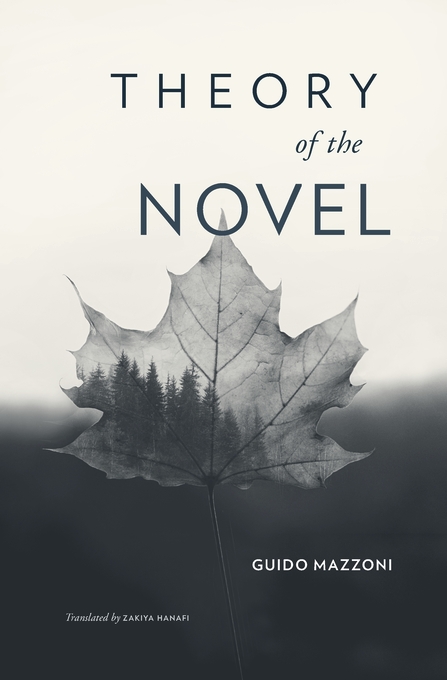
Theory of the Novel
Translated by Zakiya Hanafi
Harvard U.P.
ISBN 9780674333727
Publication: January 2017
408 p.
The novel is the most important form of Western art. It aims to represent the totality of life; it is the flagship that literature sends out against the systematic thought of science and philosophy. Indebted to Lukács and Bakhtin, to Auerbach and Ian Watt, Guido Mazzoni’s Theory of the Novel breaks new ground, building a historical understanding of how the novel became the modern book of life: one of the best representations of our experience of the world.
The genre arose during a long metamorphosis of narrative forms that took place between 1550 and 1800. By the nineteenth century it had come to encompass a corpus of texts distinguished by their freedom from traditional formal boundaries and by the particularity of their narratives. Mazzoni explains that modern novels consist of stories told in any way whatsoever, by narrators who exist—like us—as contingent beings within time and space. They therefore present an interpretation, not a copy, of the world.
Novels grant new importance to the stories of ordinary men and women and allow readers to step into other lives and other versions of truth. As Theory of the Novelmakes clear, this art form narrates an epoch and a society in which individual experiences do not converge but proliferate, in which the common world has fragmented into a plurality of small, local worlds, each absolute in its particularity.
Guido Mazzoni is Associate Professor in the Department of Philology and Literary Criticism at the Università di Siena, Italy.
*
Table of Contents
- Translator’s Note
- Introduction: Truth and Literature
- Why the Novel Matters
- Books of Life
- Games of Truth
- Literature and Reality
- What Is the Novel?
- 1. A Theory of Narrative
- People and Leaves
- Mimesis and Concept
- The Hidden Contents of Mimesis
- The Confines of Mimesis
- Between Nothingness and Ideas: The Mimetic Discontinuity
- Stories
- Narrative and Existential Analytics
- Narrators
- Levels of Reality
- Being in the World
- 2. The Origin of the Novel
- Historical Semantics
- The Question of Origins
- The First Corpus
- Symbolic Thresholds: 1550
- Symbolic Thresholds: 1670
- The Territory of the Romance
- The Territory of the Novel
- The Rise of the Novel
- 3. The Novel and the Literature of the Ancien Régime
- The Dialectic of Continuity and Change
- A Cohesive Epoch
- Classicism and the Separation of Styles
- Aesthetic Platonism
- Moralism and Allegory
- Moralistic Apparatuses, Poetic Justice, Exemplary Heroes
- The Legitimization of the Romance
- The Legitimization of the Novel
- 4. The Book of Particular Life
- The Romance and Private Aims
- Suspense, Entrelacement, and the Romanesque
- The History of Private Lives
- A Discursive Gap
- The Pathos of Proximity
- The Interesting
- The Novel’s Readership
- Particular Life
- National Differences: France and England
- 5. The Birth of the Modern Novel
- Freedom from the Rules of Style
- Freedom from Allegory and Morality
- Moralism, Empathy, and Observation
- A New Conceptual Ether
- The Weight of Novels
- The Expansion of the Narratable World
- The Middle Station of Life
- The Serious Mimesis of Everyday Life
- The World of Prose
- Center and Periphery
- Narrative Democracy
- 6. The Nineteenth-Century Paradigm
- Abstractions
- Realisms
- The Frameworks of the Nineteenth-Century Paradigm
- The Figurative Novel and Its Theatrical Model
- The Discovery of the Environment
- Dependent Individuals
- The Melodramatic Model
- The Significance of the Melodramatic Novel
- The Romance in the Novel, Special Characters
- The Novel of Personal Destinies
- A Map of the Nineteenth-Century Paradigm
- 7. The Transition to Modernism
- The Second Phase of Nineteenth-Century Realism
- Realism without Melodrama
- Historical Stations
- New Narrators
- New Plots
- New Characters
- Three Turning Points
- Short Stories and Epiphanies
- Worlds Apart
- Modern Forms of the Romance
- The Sense of a Transformation
- 8. On Contemporary Fiction
- After Modernism
- The Decline of the New
- A Multiple Archipelago
- Conclusion: A Theory of the Novel
- The Genre of Particularity
- Relativism and Perspectivism
- An Analytics of Existence
- Discursive Transformations
- The Design of This Book
- On the Present State of Things
- Acknowledgments
- Index